by Véronique Zanetti (ZiF Bielefeld, Germany), G. Ary Plonski (UBIAS, IEA São Paulo, Brazil) and Britta Padberg (ZiF Bielefeld, Germany) | Originally posted on the blog Interdisciplinarity
Heavily shaken by the corona pandemics many of us are currently thinking about how we could contribute to overcome this unprecedented situation. The COVID-19 crisis not only challenges disease control and crisis management, but may also have long-term and far-reaching impacts on states, societies and international cooperation. There are increasing indications that the world will look different after the crisis and that globalization will be questioned in many areas. According to these observations, the COVID-19 crisis would mark a turning point. In times of deep uncertainty, science is asked to look to the future and to flank a rational discourse about how to react to the current global crisis, and therefore now better cope with other tantamount global challenges such as the climate change.
Since this challenge is genuinely interdisciplinary, Institutes for Advanced Studies are rich pools to fish for visionary ideas and scientific observations. We are very happy that a number of distinguished and young scholars from different fields and countries agreed to write short essays on how the world will change and how it should change. The pieces will be posted bit by bit, two texts per week. Since science and art make a good couple in developing a good sensorium for tectonic shifts we also asked the comic artist Oliver Grajewski to complement and contrast the academic way of thinking. He will deliver one short comic series each week.
We hope that the blog will contribute to sketching out ideas of a world that is more sustainable, fairer and fit for the future and are very much looking forward to lively discussions.
Selected contributions
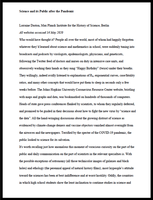 |
Science and its public after the pandemic
by Lorraine Daston, |
|---|---|
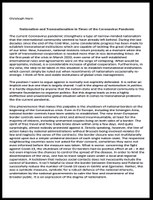 |
Nationalism and transnationalism in times of the coronavirus pandemic
by Christoph Horn, |
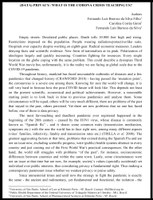 |
(Data) privacy: what is the corona crisis teaching us?
by Fernando Luís Barroso da Silva Filho (University of São Paulo, Brazil, School of Law), Carolina Corrêa Giron (University of Triângulo Mineiro, Brazil, Health Department), and Fernando Luís Barroso da Silva (University of São Paulo, Brazil School of Pharmaceutical Sciences) |
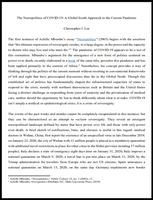 |
The necropolitics of COVID-19: a global south approach to the current pandemic
by Christopher J. Lee, |
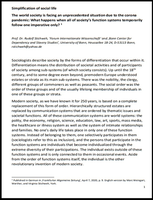 |
Simplification of social life
by Rudolf Stichweh, |
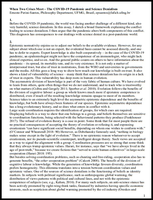 |
When two crises meet – The COVID-19 pandemic and science denialism
by Ernesto Perini-Santos, |
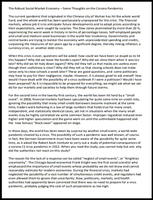 |
The robust social market economy – Some thoughts on the corona pandemics
by Frank Riedel, |
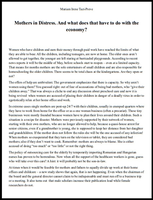 |
Mothers in distress. And what does that have to do with the economy?
by Mariam Irene Tazi-Preve, |
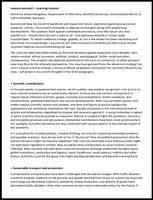 |
Lessons learned? – Learning lessons!
by Katharina Kohse-Höinghaus, |
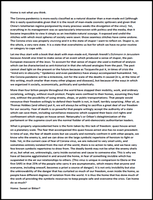 |
Home is not what you think
by Eva Illouz, |
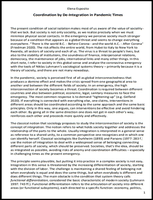 |
Coordination by de-integration in pandemic times
by Elena Esposito, |
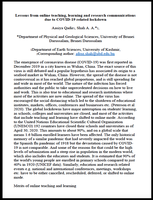 |
Lessons from online teaching, learning and research communications due to COVID-19 related lockdown
by Aasiya Qadir (Earth Sciences, University of Kashmir) and Afroz Shah (Physical and Geological Sciences, University of Brunei, Darussalam) |
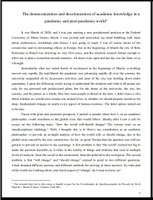 |
The democratization and decolonization of academic knowledge in a pandemic and post-pandemic world*
by Felipe Carvalho, |
 |
My peace depends on your peace: a vision of an alternative world already being built and revealed by the pandemic |
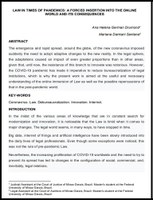 |
Law in times of pandemics: a forced insertion into the online world and its consequences
by Ana Helena German Drumond (Law, Court of Justice of Minas Gerais, Federal University of Minas Gerais, Brazil) and Mariana Damiani Santana (Law, Court of Auditors of Minas Gerais, Federal University of Minas Gerais, Brazil) |
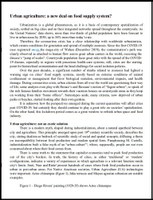 |
Urban agriculture: a new deal on food supply systems?
by Rinaldo Rossi, |
 |
Memory studies for the future. Remembering (COVID-19) as survival value
by Adam F. Kola, |
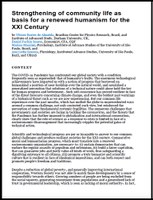 |
Strengthening of community life as basis for a renewed humanism for the XXI century
by Ulisses Barres de Almeida (Brazilian Center for Physics Research, Brazil, and Institute of Advanced Study, Durham University, UK), Daniel Fachin Soares (Economist, CFA, CQF), Marina Massimi(Psychology, Institute of Advance Studies of the University of São Paulo, Brazil), and Ana Lydia Sawaya (Physiology, Institute of Advance Studies, University of São Paulo, Bazil, and UBIAS) |
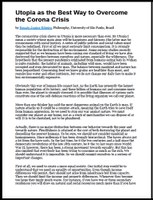 |
Utopia as the best way to overcome the corona crisis
by Renato Janine Ribeiro, |
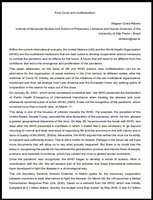 |
Post-covid and multilateralism
by Wagner Costa Ribeiro, |
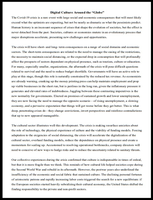 |
Digital culture around the "globe"
by Stoyan V. Sgourev, |
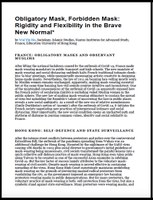 |
Obligatory mask, forbidden mask: rigidity and flexibility in the brave new normal*
by Wai Yip Ho, |
 |
The ways after
by José Gracia Bondía, |
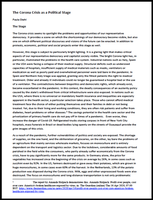 |
The corona crisis as a political stage
by Paula Diehl, |

